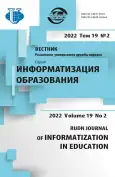The use of flash cards in teaching as a means of developing students’ verbal creativity
- Autores: Vekua N.N.1, Mamaeva E.A.2
-
Afiliações:
- The Sochi Institute (branch) of Peoples’ Friendship University of Russia (RUDN University)
- Vyatka State University
- Edição: Volume 19, Nº 2 (2022)
- Páginas: 108-120
- Seção: PEDAGOGY AND DIDACTICS IN INFORMATIZATION
- URL: https://journal-vniispk.ru/2312-8631/article/view/321312
- DOI: https://doi.org/10.22363/2312-8631-2022-19-2-108-120
- ID: 321312
Citar
Texto integral
Resumo
Problem and goal. Development of linguistic diversity, creative ideas in foreign language communication are key areas of international activity supported at the level of the United Nations. An important condition for effectiveness of any dialogue is verbal creativity. Preparation of the individual for professional creative thinking, for overcoming verbal stereotypes takes place in professionally-oriented communication. The authors suggest using interactive resources of flash cards in teaching to develop students’ verbal creativity. Metodology. Teaching a foreign language using flash cards is based on the Leitner method. Flash cards as thematic cards depicting objects (concepts) are also used for development of speech (vocabulary, morphology, word formation, syntax, pronunciation), and psychological processes leading to new results (fluency, originality, flexibility). The testing developed by the authors is carried out, it includes the parts “Vocabulary,” “Morphology,” “Word formation,” “Syntax,” “Pronunciation,” “Torrance figure test.” An experimental study was conducted at Vyatka State University during the study of the disciplines “Electronic resources in the professional activity,” “Foreign language.” 60 first-year students studying psychology (bachelor degree level) are involved. The Lexilize resource is used to create flash cards. Statistical processing of the results was performed using Pearson’s chi-square test. Results . Students study services for creating flash cards, use them to process new material, memorize and present concepts, word formation in a variety of contexts. Statistically significant differences in the qualitative changes that occurred in the system according to the levels of development of verbal creativity were revealed. Conclusion. The features of the presented version of using flash cards when teaching are described: combination with other means (mobile applications, simulators, infographics) and traditional forms of information transfer; interdisciplinary connections. Rules are formulated, implementation of which ensures effectiveness of using flash cards for development of verbal creativity.
Palavras-chave
Sobre autores
Natalya Vekua
The Sochi Institute (branch) of Peoples’ Friendship University of Russia (RUDN University)
Email: vekua.natalya@yandex.ru
ORCID ID: 0000-0001-5659-5881
PhD in Philology, Associate Professor, Dean of the Faculty of History and Philology, Head of the Testing Centre for Migrant Workers
32 Kuibysheva St, Sochi, 354348, Russian FederationEkaterina Mamaeva
Vyatka State University
Autor responsável pela correspondência
Email: mamaevakathy@gmail.com
ORCID ID: 0000-0002-7721-8820
senior lecturer, Department of Digital Technologies in Education
36 Moskovskaya St, Kirov, 610000, Russian FederationBibliografia
- Sur E, Ateş M. Examination of the relationship between creative thinking skills and comprehension skills of middle school students. Participatory Educational Research. 2022;9(2):313-324. http://doi.org/10.17275/per.22.42.9.2
- Verkhorubova NV. Effective increase in vocabulary in English lessons with the help of mnemonics and the development of creative thinking. Koncept. 2014;27:35-42. (In Russ.) Available from: https://elibrary.ru/item.asp?id=22655929 (accessed: 25.02.2022).
- Zavershneva EYu. Prototype of the double stimulation technique: the first experimental study by L.S. Vygotsky (Gomel, 1923). Voprosy Psychologii. 2013;(3):125-142. (In Russ.) Available from: https://elibrary.ru/item.asp?id=21196314 (accessed: 25.02.2022).
- Barysheva TA. Psychology of creativity. Moscow: Yurait Publ.; 2020. (In Russ.) Available from: https://urait.ru/bcode/449585 (accessed: 25.02.2022).
- Wang H. Exploring the relationships of achievement motivation and state anxiety to creative writing performance in English as a foreign language. Thinking Skills and Creativity. 2021;42:100948. http://doi.org/10.1016/j.tsc.2021.100948
- Ortega-Martín JL, Portnova T, Zurita-Ortega F, Ubago-Jiménez JL. Correlation between the need for cognitive closure and narrative creativity in secondary education. International Journal of Environmental Research and Public Health. 2021;18(8):4333. http://doi.org/10.3390/ijerph18084333
- Dudorova EV, Shumkova SV. Features of verbal and non-verbal creativity in students of social and artistic training programs. Bulletin of the Perm University. Philosophy. Psychology. Sociology. 2018;(2):271-277. (In Russ) http://doi.org/10.17072/2078-7898/2018-2-271-277
- Soboleva EV, Suvorova TN, Grinshkun AV, Nimatulaev MM. Formation of group creative thinking when working with virtual walls. European Journal of Contemporary Education. 2021;10(3):726-739. http://doi.org/10.13187/ejced.2021.3.726
- Yemez N, Dikilitaş K. Development of verbal creativity by bilingual and English as foreign language learners in kindergarten to 8th-grade schools. Creativity Studies. 2022;15(1):25-39. http://doi.org/10.3846/cs.2022.12603
- Ying Y, Marchelline D, Wijaya G. Using technology-flashcard to encourage students learning mandarin. Journal of Physics: Conference Series. 2021;1764:012138. http://doi.org/10.1088/1742-6596/1764/1/012138
- Malik C, Mahmud M, Anshari A, Salija K. EFL teachers’ strategies in teaching English at Kampung Inggris Pare, Kediri, Indonesia. Asian EFL Journal. 2020;27(31):165-192. Available from: https://www.researchgate.net/publication/344395247_EFL_Teachers'_Strategies_in_Teaching_English_at_Kampung_Inggris_Pare_Kediri_Indonesia (accessed: 25.02.2022).
- Barac R, Bialystok E, Castro DC, Sanchez M. The cognitive development of young dual language learners: a critical review. Early Childhood Research Quarterly. 2014; 29(4):699-714. http://doi.org/10.1016/j.ecresq.2014.02.003
- Bernabeu-Brotons E, De-La-Peña C. Creatividad en educación superior: estudio exploratorio con función ejecutiva y rendimiento académico. Profesorado. 2021;25(3):313-330. http://doi.org/10.30827/profesorado.v25i3.9546
- Lai C, Jong B, Hsia Y, Lin T. Integrating flash cards with narratives for mobile learning of English vocabulary. International Journal of Interactive Mobile Technologies. 2020;14(4):4-16. http://doi.org/10.3991/IJIM.V14I04.11723
- Van Dijk M, Blom E, Kroesbergen EH, Leseman PPM. The influence of situational cues on children’s creativity in an alternative uses task and the moderating effect of selective attention. Journal of Intelligence. 2020;8(4):1-20. http://doi.org/10.3390/jintelligence8040037
Arquivos suplementares









